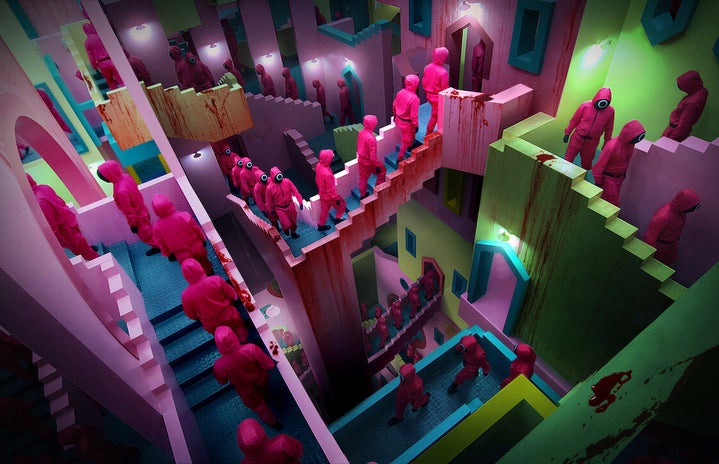Unless you’ve been living under a rock for the past few weeks, you’ve probably seen someone talking about Squid Game, the Netflix Korean thriller drama that has taken the world by storm. The show follows 456 cash-strapped people who receive a mysterious invitation to play a set of children’s games, and the winner walks away with 45.6 billion won, the South Korean currency. However, the twist is that losing any of the games means instant death. Squid Game is currently on track to become Netflix’s biggest show ever .
As someone who has an unhealthily short attention span and rarely watches television, I almost never give into hype when it comes to popular TV shows. I have not seen Stranger Things, The Queen’s Gambit, You, The Witcher, or Bridgerton. And although I listen to Korean artists and have seen the movie Parasite, I’ve never watched a K-drama before either. But something about the juxtaposition of schoolyard games and murder had me running to Netflix to binge the entire series before I could get majorly spoiled. And now that I’ve seen the show, I can safely say that Squid Game absolutely deserves to be #1 in 90 countries.
While the high stakes of the plot will definitely keep the viewer fully invested enough to immediately hit play on the next episode, what truly captivated me are the various players that we meet in the game. The main character of the show is Gi-hun, a middle-aged divorced and indebted man with a daughter who he’s struggling to financially support. Gi-hun is not a perfect hero and he makes a few morally questionable decisions, but I was still able to root for him because his actions were understandable given his circumstances. A standout character to me is Jun-ho, a police officer who sneaks into the games and disguises himself as one of the masked workers in order to find his missing brother. His wit and willingness to do whatever it takes to expose the game hosts, including killing other workers, kept me invested in his subplot for the entirety of the show. There are also players who I disliked, but their characters were never cartoonish or two-dimensional; rather, their despicable actions were what humanized them.
At the core of Squid Game is a critique of class divides and capitalism. Although this theme becomes a bit heavy handed at times, the plot and characters are intriguing and complex enough that it didn’t bother me. The ending leaves room for a second season, and I am very excited to see what could possibly happen next. If you still haven’t given in to the hype train yet, I would highly recommend jumping aboard now. That way, you can finally understand why the end of episode 6 had me (and everyone else) sobbing.
Note: The show is very violent and graphic, so please check content warnings if this is something that may bother you!


